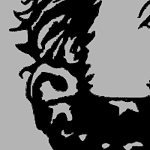
A few days ago I saw a game on Twitter where people posted the “grudge they cherish the most.” It was fun reading—people sharing their stories of That One Guy who said something immensely insulting that stuck with them for years and years. I had a story I almost shared, but I didn’t. Why? Because it’s complicated. In many ways, it’s my origin story:
I grew up surrounded by books. Specifically, by science fiction and fantasy books. Once upon a time my parents had a huge library of (mostly) paperbacks, ranging from the classics (Heinlein, Asimov, Pohl, etc.) to authors who wrote one book and were never heard from again. They were always there, and I was always welcome to read them. Some of them I liked, some were boring, some were a bit beyond my ability to grasp… it was, in retrospect, glorious. Even at the time I knew it was pretty cool.
Along with books, we had magazines. My dad had stacks of back issues of SF magazine. There were a lot of back issues of Analog, a few runs of Omni, I think some Asimov’s as well… but what I really remember are the back issues of Analog. There were cases of them.
I liked the novels more than I liked the magazines. The stories in the magazines always felt less like stories, and more like political and sociological essays disguised as fiction. I was never opposed to the idea of writers putting a point of view in their stories, but I did want actual story, and the short stories I read in Analog always felt like the story-parts had been chopped out to make room for more idea-parts. Consequently, I rarely made I through an entire issue—I would grow impatient and eventually go back to the novels, where there could be a healthier mix of people Asyouknow Bobbing AND shooting space lasers at killer robots.
Apparently I’m shallow. I’m OK with this.
By the time I was in my mid-teens, Science Fiction magazines (and Analog in particular) were inaccessible and mysterious puzzles. I thought of Analog, specifically, as The Last Mountain To Climb: if I could get to the point where I could read it and actually, genuinely enjoy it, I would achieve a new level of SF enlightenment. I would, like all the Pokemon before me, evolve into something greater and more powerful.
When I was sixteen I gave it my last shot.
I remember I was sixteen because I was driving, but I still wore braces. I remember picking up a random issue of Analog and was determined to read it from cover to cover. I remember opening it and reading an editorial written by Ben Bova, who was Editor in Chief at the time.
The essay was about Star Wars.
Boy, did he hate Star Wars.
And boy, was he angry at people who didn’t hate Star Wars.
I read a man, famous in his own right as an author of “hard” science fiction, declare that not only was Star Wars not legitimate science fiction, but also that fans of Star Wars could not legitimately call themselves fans of science fiction, and that they were in fact a danger to the genre, were destroying the genre, and should be excluded from the genre.
Star Wars was a horrible example of science fiction, Bova claimed, because it didn’t actually have any science. It was a fantasy movie with gadget tapestry, and the moral of the story was “turn off the computer and use magic instead.” And because of these things, the interest in the movie was actually bad for science fiction as a genre because it was undoing all the progress they’d made trying to make the genre “respectable.”
Star Wars fans were equally deplorable in his eyes, because they didn’t really understand what they claimed they were liking and when they said “yeah, I like science fiction, I loved Star Wars” they were embracing none of the things that made the genre important.
I… didn’t react well.
It’s not like it was particularly easy, back then, to be enthusiastic about science fiction. Or fantasy. Or gaming—that was back when the only time “normal” people heard about Dungeons and Dragons was when someone accused gamers of being satanic, suicide-prone drug users. I didn’t have a lot of peers who were, um, sympathetic to my passions… and even fewer who shared them. One of the things that kept me reasonably sane was the sheer volume of science fiction and fantasy books my parents had: there were a lot of authors who wrote the things I liked. I knew that, because I could go into our basement and see all the different names, and because I knew that I knew there was a market for it, and because I knew that I also knew that there were other people like me, and I would get a chance to meet them someday.
So there I was, that kid, being called a fake fan by none other than Ben fucking Bova. Mr. Bova didn’t know he was calling me that—he wrote the editorial in the 70s, I read it in the 80s—but there it was all the same. One of the big names in the genre, complaining about how people like me—like me—were destroying his genre, because we weren’t doing it right. I felt, for lack of a better word, betrayed. And as I reeled from that sense of betrayal, as I fought to contain the white-hot fountain of righteous rage welling up inside me, I did thing that all Supervillains do before they embark on their dastardly careers:
I swore revenge.
Not good enough, was I? Not a true fan, was I? Destroying the genre, am I? Okay. Fine. If that’s the way it is, that’s the way it will be. I will destroy your precious genre. If you hate space operas so damn much, I will do everything in my power to ensure that space opera is always the first thing people think of when they think of science fiction. I will raise it up above all others, favor it above all others. I will see it win. In short: I would show them. I would show them all!
Yes, it seems that has always been my goal.
Life went on after that, of course. I got out of high school, made it through college, discovered music, discovered computers, started a webcomic, got married, became a father. When I recorded music in a home studio and uploaded it to mp3 sites I was accused of destroying music. When I started a webcomic I was accused of destroying professional syndicates, and also of destroying webcomics (not by the same people, though.) I was also accused of not being funny, but that’s an occupational hazard. And when I finally got back into writing, and started self-publishing, I was accused of destroying the genre all over again, though for a completely different set of reasons.
And wouldn’t you know it, the first novel I ever finished was a space opera.


